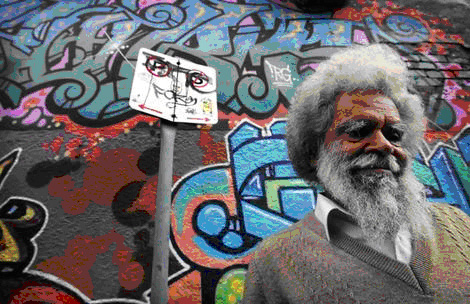
 Jack Charles, long-time actor, former heroin addict and latterly community activist, stars in Amiel Courtin-Wilson's film Bastardy. Photo: Rebecca Hallas THE first we see of Jack Charles, thespian, he is shooting up heroin in a filthy communal laundry. It's not a role. For decades this was his life - on one hand distinguished indigenous actor; on the other, junkie, burglar, jailbird. Yet today, Charles sits in a trendy Fitzroy cafe, talking about how his decades of heroin use and jail are behind him, his plans to reach out to young indigenous offenders and his desire to demonstrate to white Australians the terrible impact of Stolen Generation policies. "I see myself as a role model," he says. By any measure Charles, now in his 60s, has lived an extraordinary life. His frank heroin use is just one of the eye-opening scenes in Bastardy, one of two films being shown at the Blak Nite Cinema in the Treasury Gardens on March 27 and 28. The result of seven years' work by Melbourne filmmaker Amiel Courtin-Wilson, Bastardy first screened to accolades at the Melbourne International Film Festival last year. It is set for a limited cinema release mid-year. Removed from his mother aged just 10 months, Charles was sent to the notorious Box Hill Boys' Home, the scene of terrible stories of physical and sexual abuse. At 14, he was told he was to be fostered to a white family in Doncaster and given a tram ticket. But not before he received six of the best - one last brutal, petty caning, owed for some minor past transgression. A yearning for family led him to Fitzroy. He was barely off the tram when an elderly Aboriginal man approached him. "You're a Charles; you're Blanchie's boy," he was told. For this apparent "transgression" the woman he lived with called the police, and Charles, a ward of state, was taken to juvenile detention. Undeterred, Charles later tracked Blanche Charles to Swan Hill. "We go along this track, tree-lined either side and I see a white house in the distance, and I think, 'Oh, Mum's doing well, to be living up here - and suddenly we veer over to this meandering riverbed, and I see these humpies," he recalls. Even though he had been warned by a local copper he'd "be more welcome" if he took along a carton of beer to their reunion, Charles was still horrified to find his mother abjectly alcoholic and living in poverty. Another shock - Blanche had borne 13 children. Two had died in childbirth, the others had also been removed. (Since then, Charles has managed to connect with his brother Artie and sisters Christine, Esmay and Eva-Jo.) Charles hated alcohol, but heroin was a different story. It grew to be one of his two loves - acting was the other. His career began in community theatre. He flourished so quickly that in 1971, Charles and fellow actor Bob Maza founded Australia's first Aboriginal theatre company, Nindethana, paving the way for the emergence of black theatre. Films followed, including a role as Uncle Tabidgi in Fred Schepisi's The Chant of Jimmy Blacksmith. But the demons also lurked. He was breaking into people's houses. What had started in his late teens as a mix of boredom and bad company grew worse with his drug habit. Inevitably, it ended in jail time. Over the years, lots of it. Followed by the resumption of his heroin use, homeless- ness, crime and more jail. Yet Charles continued to perform, even as he lived on the streets. This would sometimes lead to an amusing collision of worlds. In Bastardy, Charles picks up a film part as a soup kitchen regular. "Look at this," he points to the dirty jacket he's been asked to wear. "I wouldn't be seen dead in this!" It would seem a vicious, self-defeating cycle and yet, unexpectedly, amazingly, Charles has triumphed over it. This hard-won self-knowledge impels him to reach out to other incarcerated black men. Charles says he wants to establish a local indigenous workshop and is hoping interest sparked by Bastardy will give his push more impetus. In the meantime, he is an in-demand public speaker, performing traditional welcome to country ceremonies (he is from Yorta Yorta country), has completed a national leadership course and now assists RMIT student filmmakers. Amiel Courtin-Wilson, who developed an intensely close relationship with Charles, says he has become increasingly driven as a community activist. "Jack's unflappable optimism was enough to keep him afloat through so many years of potentially crushing adversity so now he is liberated from his past foibles he can truly thrive," he says. Charles would prefer to romanticise his criminal past as that of a gentleman cat burglar, or Robin Hood figure. He points out he often stole food. Or it was a political act - the houses were on "his land". This defiant attitude is hardly likely to win the sympathy of anyone who has been the victim of repeated break-ins. But at the end of our interview, he is suddenly vulnerable. "Be nice to me, won't you," he says. I tell him I admire what he is doing, and this is true. Charles has done his time, and now he's hoping it will begin.
Jack Charles and Amiel Courtin Wilson will introduce Bastardy at Blak Nite cinema on Friday, March 27 in the Treasury Gardens.
Lionel, a film about boxer Lionel Rose, will show Saturday, March 28. For more information go to www.thatsmelbourne.com.au
|